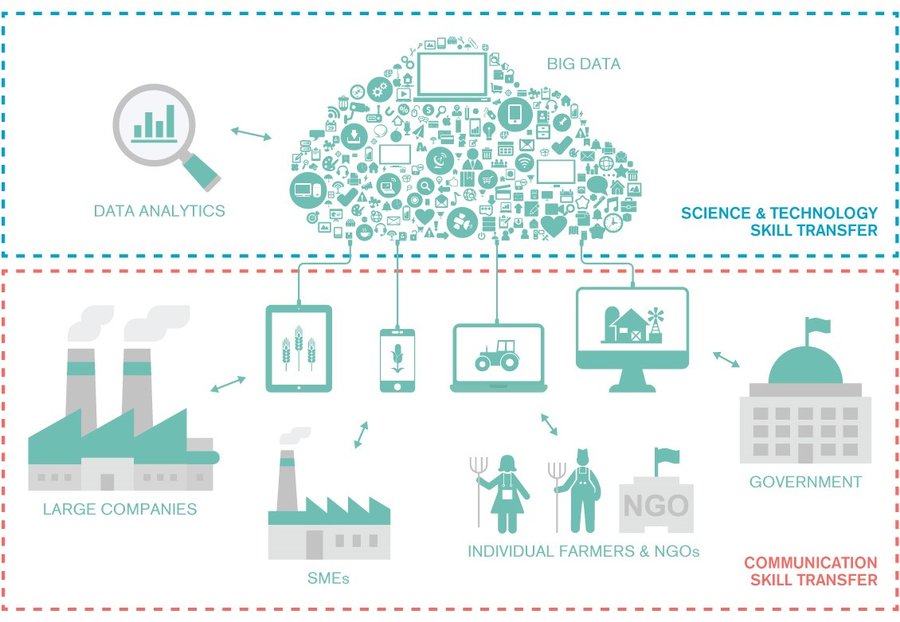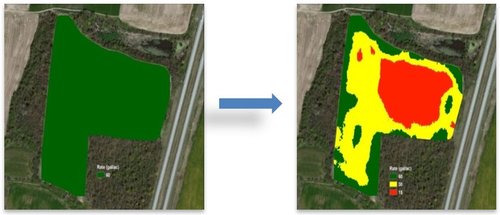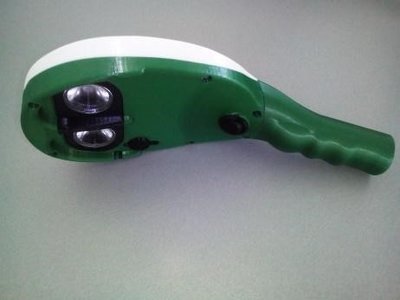Earth’s population is expected to reach 10 billion people by 2050 and, as result, we will have to increase agricultural production for as much as 70 % to feed all its inhabitants. We are already cultivating almost every piece of land available and we are using ever larger quantities of synthetic fertilisers and pesticides. In this way, we are jeopardising our fragile eco-system which is passing through climate change and crisis caused by pollution. The solution for this challenge lies in artificial intelligence (AI).
Sensors, robots, satellites, GPS and drones have become a part of everyday life and serve as invaluable data sources concerning crop growth, soil characteristics and weather conditions. Although each of them is very interesting on its own, these datasets are reaching their full potential only after we aggregate them and apply advanced AI algorithms. There is a harsh debate in the scientific community whether artificial intelligence will ever become as creative as human and whether it will ever become self-aware. In the 21st century, information technologies allow us to comprehend large amounts of data and extract hidden knowledge about agricultural production and processes happening inside the plants. Sensors and technological advances have already been adopted by numerous farms globally to assist in more precise applications and better decisions in the framework of a new farming approach called precision agriculture.
Traditional agriculture vs. precision agriculture
According to traditional farming the fields are treated homogeneously applying one flat rate of agrochemicals at the whole field. However, most fields show significant spatial variability which creates different demands at each location. Therefore, applying one general rate per field leads to over-application in the areas that demand less, increasing the cost of application and the environmental impact, and under-application in the areas where the demands are higher leads to yield loss and possibly decreased quality.
In precision agriculture, the fields are treated applying variable rates of inputs (irrigation water, fertilisers, pesticides, etc.) according to the actual needs of each location in the field. This way the efficiency is increased, yield, quality and impact to the environment are optimised.
In modern agriculture mechanisation and sensors are continuously being developed, making precision farming applications highly automated and available to more and more farmers.
BioSense Institute
BioSense is a research & development institute which deals with the application of IT in biosystems and it is home to the Knowledge Discovery Group. Our group conducts research in the area of applied artificial intelligence, machine learning and data analytics in agriculture. BioSense is also a Work Package leader in the IoF2020 project.
DRAGON project
In October 2018, BioSense started implementation of the Twinning project DRAGON - Data-driven Precision Agriculture Services and Skill Acquisition which has received funding from the European Union’s Horizon 2020 research and innovation programme under grant agreement No 810775.
DRAGON project’s aim is to help ambitious juniors become experts and to increase the scientific and innovation capacity of the Knowledge Discovery Group, which will, through this project, become the Knowledge and Innovation Group. The key partners are two institutions renowned for their excellence in the IT as well as agri sector: Wageningen University from the Netherlands (leading partner of IoF2020) and Agri-EPI centre from Scotland. They will provide scientific and technical support for our research and organisation of workshops, summer schools, research visits and other events which gather industry and academia and promote knowledge transfer from Western Europe to Serbia.
BioSense solutions
At BioSense we realised that the cost of the equipment and the complexity of use are still the main drawbacks in the adoption of these technologies. Hence, BioSense institute aims to develop low cost, easy to use precision farming solutions that can be applied anywhere regardless of the size, type and age of agricultural machinery used by the farmers and make IT an important tool to drive small farms towards sustainability. To this end, a free web-based and android-based digital platform named “AgroSense” was developed to support farmers in decision making and field management. It was released in October 2017 and it already has over 10000 users.

In addition, the efforts of BioSense institute are focused on the development of low-cost sensors, applications and solutions such as the “Plant-O-Meter” crop sensor which can detect the status of the crops with a simple scan over the canopy.
Numerous additional sensors and systems such as LORA wireless communication system, soil moisture sensors, soil fertility sensors and others, are also in different development stages and will be fully functional and available in the years to come.
With these new applications and sensing solutions even smallholder farmers can benefit from the diffusion of IT into agriculture, making precision farming widely accepted in the years to come.
